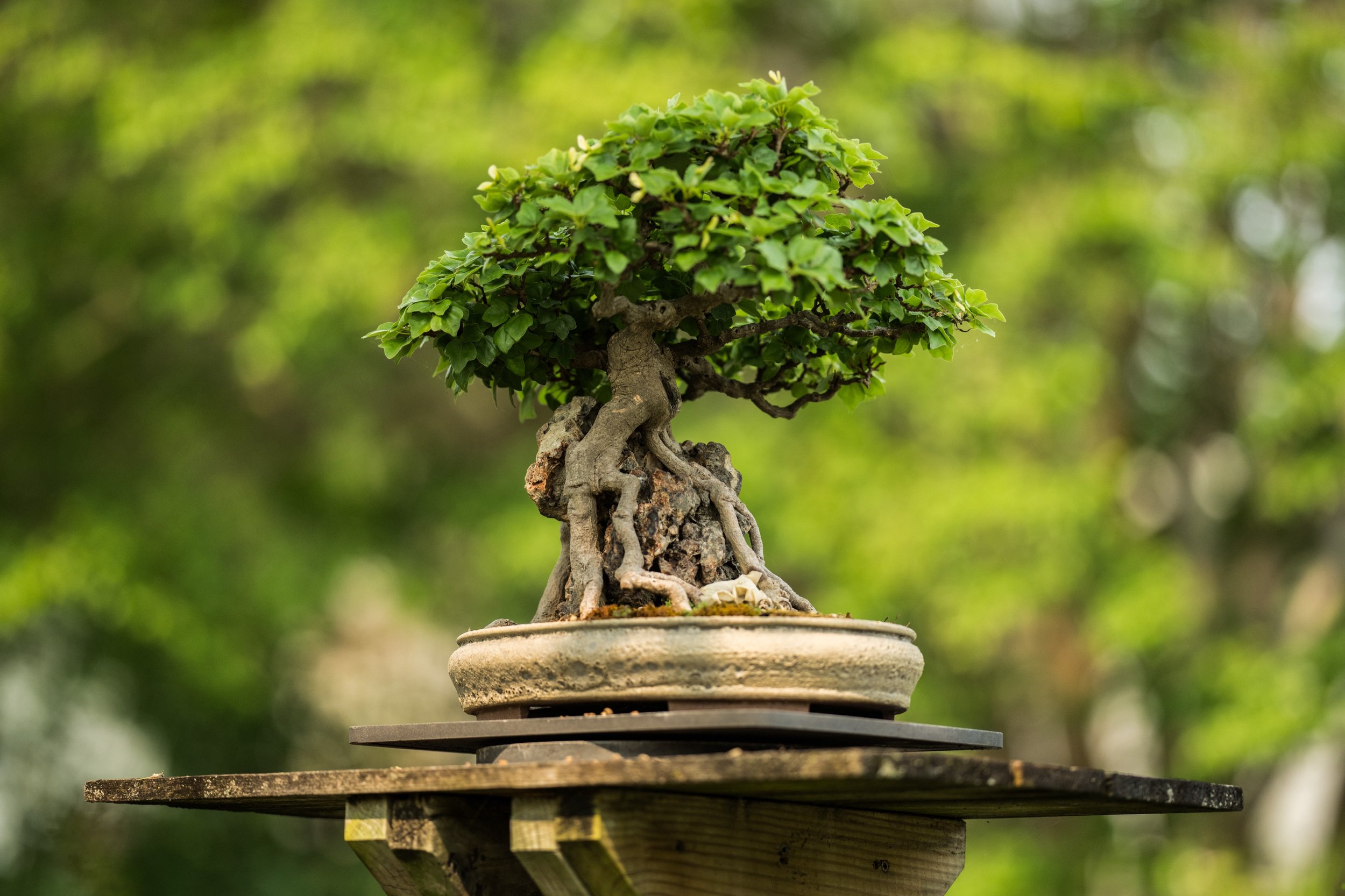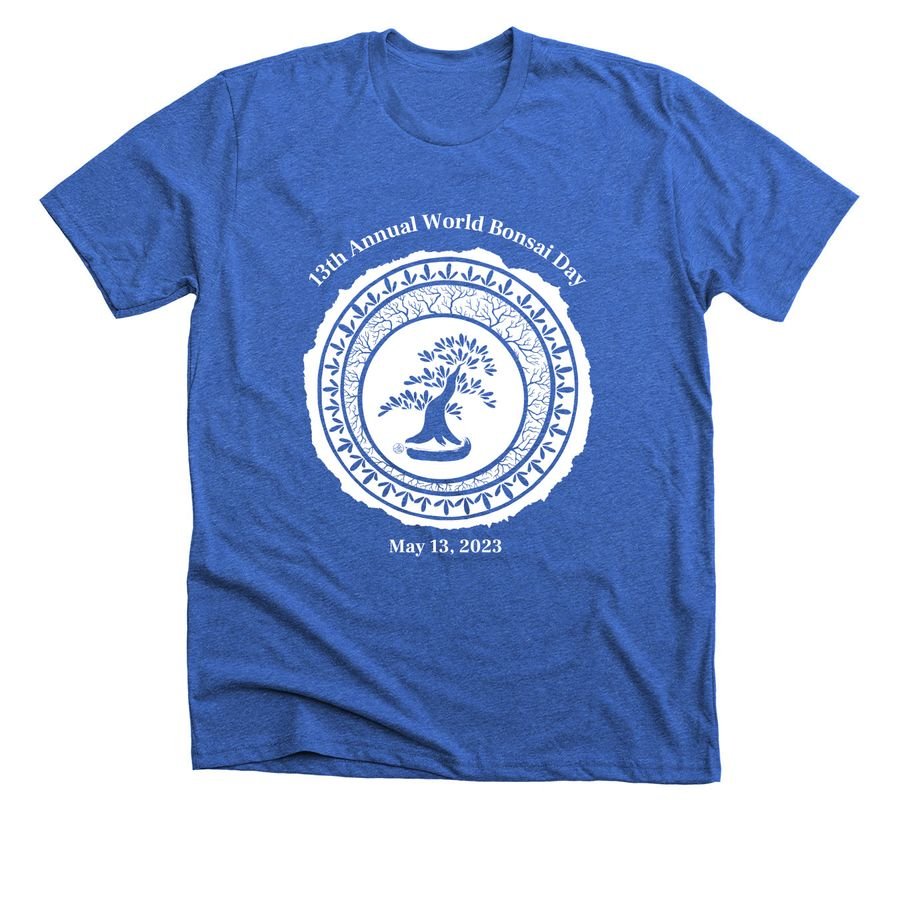Aaron working on his bonsai.
The artwork featured on this year’s commemorative World Bonsai Day t-shirt was designed by Aaron Stratten. Aaron is a bonsai lover, multi-medium artist, art educator, and self-proclaimed “gardenbody.” He currently serves as Potomac Bonsai Association’s President and has taught art at Faifax County Public Schools for over a quarter century. We were lucky to sit down with him to learn more about his inspiration for this year’s shirt, what he loves most about bonsai, and why he thinks you should join a bonsai club. Read all about Aaron below…And, order your t-shirt for this year’s World Bonsai Day (WBD) on May 13th.
1.) Tell us a bit about your art form, your process, and your history.
To understand me as an artist, you have to first understand that I am an art educator.
I have served Fairfax County Public Schools for nearly 25 years as a high school and middle school art teacher, and as the K-12 art educational specialist in the fine arts office. I have also taught at the preschool and college levels. Art teachers in public schools teach a full range of media and skills. This educator lens reinforces a widely-varied personal art practice which includes drawing, painting, printmaking, sculpture, ceramics, digital art, and of course, bonsai. I believe deeply in teaching and practicing a variety of ideation and planning processes as the foundation for creating artwork, and for solving any other sort of problem, so my process involves many drafts, sketches, and iterations.
For my personal education in art, I went to Indiana University where I earned a BS in art education and a BA in fine arts with a focus on painting. I later got a Masters from Virginia Commonwealth University (VCU) where I had a dual focus on painting and printmaking. The irony is not lost on me that I spent so many years training in two-dimensional media and now spend most of my creative energies in three dimensions, shaping living trees and pots to keep them in.
2.) Tell us about the design you created for WBD. What was your inspiration, your process, technique, etc.
Aaron’s design for the 2023 World Bonsai Day commemorative t-shirt.
The 2023 World Bonsai Day t-shirt design was intended from the start as a single color, graphic image that would capture the essence of bonsai and bonsai practice rather than the image of a particular bonsai tree. It is a combination of traditional ink drawing, cut paper, and digital manipulation. Progressively larger circles contain, first, a simplified ink drawing of a tree in a pot illustrating the most basic translation of the Japanese kanji, “bon” (a pot or tray) and “sai” (a tree or plant). The second ring shows ramified branches extending outward from the center of the design just as branches extend from the trunk of a tree, and the third ring represents the life-giving foliage of the tree represented with a simplified pattern of ink brush blots. The circles are not concentric, but are very intentionally arranged with asymmetry, an essential aspect of bonsai design, and imperfectly to give a nod to the wabi-sabi aesthetic which is deeply embedded in bonsai practice and is reinforced by the imperfection of the torn-edge of the outer shape. Order yours today!
3.) How did you get involved with bonsai? What do you love about the practice and the art form?
I have practiced bonsai for over 25 years. It combines my love of art and a love of nature gained from spending so much time outside in my rural Indiana upbringing. Bonsai also aligns nicely with some of my artmaking habits. As a painter, I have often struggled with knowing when to stop. I would continue refining and adjusting a painting forever if I didn’t have a deadline. This tendency toward continuous refinement and iteration lent itself well to working with a medium that continues to grow and change over time. It also inspired the title of my bonsai blog, Bonsai Iterate.
I practiced solo for way too long and didn’t join a bonsai club until 2016 when I found the Northern Virginia Bonsai Society. My learning accelerated and before I knew it, I was president of the club, a role I held from 2018 through 2022. The best advice I can give anyone who loves bonsai is – join a bonsai club! The connections to other practitioners is invaluable, and your learning will take off leading to better, healthier trees.
4.) Do you have a favorite tree at the Museum? If so, which and why?
American Beech (Fagus grandifolia) donated by Fred H. Mies in 2003, in training since 1979
There are so many amazing trees at the bonsai museum but I am regularly drawn back to the American Beech (Fagus grandifolia) in the North American Collection. My time in the woods in the Midwest and in Virginia has fostered a love of the big, native deciduous trees of our temperate forests. While these species, like the American Beech, may not offer naturally small leaves ideal for miniature trees, they still speak to me as representations of the environments I know so well. Visiting the Beech at the museum is also inspiration for continuing to work on a few beech in my own collection.
5.) How will you be celebrating World Bonsai Day?
I am currently the president of the Potomac Bonsai Association (PBA) so I just might be spending World Bonsai Day – the weekend immediately following the annual PBA Bonsai Festival – recovering from all that we put into running that event. I’m a bit of a homebody… or maybe a garden-body (Can we make that a thing, please?) so I can’t think of anything better than spending time with my bonsai and in my garden at my home in Woodbridge, Virginia. The roses and Siberian irises will be blooming, as they always do just in time for Mother’s Day, and all the trees will be lush and green. What could be better?










